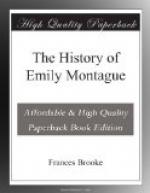He seems to know nothing of my marriage or my sister’s, and I wish him not to know of the former till he has seen Emily.
The best apology I can make for declining his offer, is to shew him the lovely cause.
I will contrive they shall converse together at the masquerade, and that he shall sit next her at supper, without their knowing any thing of each other.
If he sees her, if he talks with her, without that prejudice which the knowledge of her being the cause of his disappointment might give, he cannot fail of having for her that admiration which I never yet met with a mind savage enough to refuse her.
His daughter has been educated abroad, which is a circumstance I am pleased with, as it gives me the power of refusing her without wounding either her vanity, or her father’s, which, had we been acquainted, might have been piqued at my giving the preference to another.
She is not in England, but is hourly expected: the moment she arrives, Lucy and I will fetch her to Temple-house: I shall be anxious to see her married to a man who deserves her. Colonel Willmott tells me, she is very amiable; at least as he is told, for he has never seen her.
I could wish it were possible to conceal this offer for ever from Emily; my delicacy is hurt at the idea of her knowing it, at least from me or my family.
My mother behaves like an angel on this occasion; expresses herself perfectly happy in my having consulted my heart alone in marrying, and speaks of Emily’s tenderness as a treasure above all price.
She does not even hint a wish to see me richer than I am.
Had I never seen Emily, I would not have married this lady unless love had united us.
Do not, however, suppose I have that romantic contempt for fortune, which is so pardonable, I had almost said so becoming, at nineteen.
I have seen more of the world than most men of my age, and I have seen the advantages of affluence in their strongest light.
I think a worthy man not only may have, but ought to have, an attention to making his way in the world, and improving his situation in it, by every means consistent with probity and honor, and with his own real happiness.
I have ever had this attention, and ever will, but not by base means: and, in my opinion, the very basest is that of selling one’s hand in marriage.
With what horror do we regard a man who is kept! and a man who marries from interested views alone, is kept in the strongest sense of the word.
He is equally a purchased slave, with no distinction but that his bondage is of longer continuance.
Adieu! I may possibly write again on Wednesday.
Your faithful
Ed.
Rivers.
LETTER 218.
To Colonel Rivers, Bellfield, Rutland.
London, Nov. 18.
Fitzgerald is busy, and begs me to write to you.




